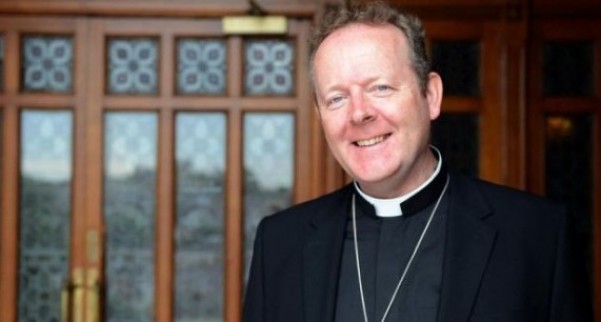Earlier today, Archbishop Eamon Martin, Archbishop of Armagh and Primate of All Ireland, visited the home of the late Martin McGuinness in Derry city to offer his condolences to the family. Archbishop Eamon said that his thoughts today are very much with Martin’s family, with his wife Bernie, his children and grandchildren and his wider circle of family and friends. He said he called to the family home this morning to offer his sympathy and his prayers at this difficult time.
Speaking afterwards to BBC Radio Foyle in Derry, Archbishop Eamon recalled the Martin McGuinness he knew. He said, “For me, Martin McGuinness has gone through a kind of variety of characters in my own lifetime. Growing up in Derry as a young teenager and indeed then in my early years of priesthood I very much associated Martin McGuinness with the IRA and in more recent times I have associated him with the very courageous efforts that he has made to try to bring us all towards a more peaceful and shared future. So, I suppose I have noticed over the last few days that those aspects of his life which really were one aspect – I mean he wasn’t a divided personality, he was a person I feel who brought his experiences with him and continued to do so right up until his retirement just before Christmas.”
Archbishop Eamon went on to reflect on the legacy of Martin McGuinness in relation to the peace process. He said, “Listening in to the many commentators and observers over the last couple of days, I think that Martin McGuinness’s death has lifted the lid on our past and perhaps revealed to us in a way that we hadn’t realised, how raw, how hurt, and how traumatised many people remain. I think Martin himself knew that. I don’t think he himself would be that surprised by the variety of comments that have been made. I think that all of us need to realise that there’s still a lot to be done. We’re in a peace process. We haven’t actually finished it. Commenters and various people who have been speaking in recent days, particularly those victims who have spoken from their heart about the kind of suffering and pain that they continue to go through, remind us that there is still a lot to be done. Therefore it puts it up to all of us to continue to work dilligently and assiduously for peace and for true deep down reconciliation in our community.”
Asked whether his death will have an impact on the talks happening in Stormont, Archbishop Eamon said, “I imagine that it might help to refocus minds. I think that we have to realise this is a very critical moment in our peace process. Our representatives who we elected in recent weeks have a lot of responsibility now to bring us forward and we’ve known for a long time that there are these remaining issues. How do we deal with the past? I know that in this city and indeed all over Ireland, people are still carrying their memories even people who’ve been involved, people who were maybe protagonists from various sides. They carry memories of things that they did or they assisted in doing. I would love to see a way in which even they could speak the truth of their past and I think that this is something that sadly in many ways I had hoped Martin Mc Guinness might have been around a lot longer because he was courageous and may even have helped to lead others to some form of truth and reconciliation process.”
ENDS


